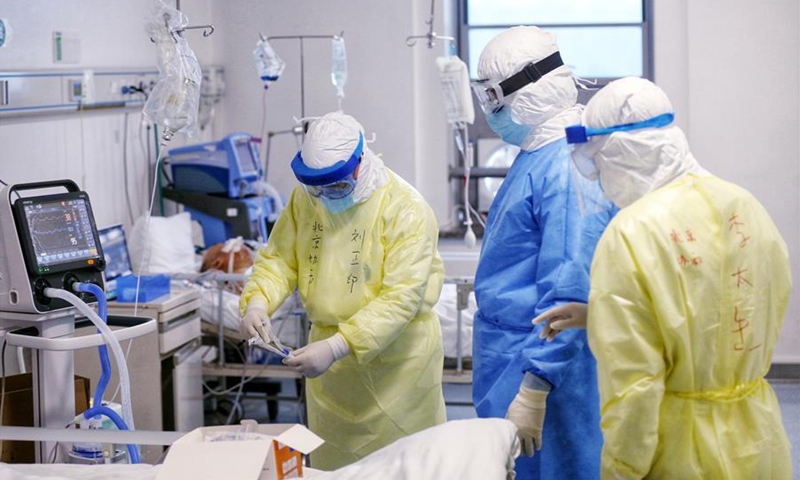Live coronavirus can be imported through long-distance transportation and infect cold-chain workers

Liu Zhengyin (L), senior doctor and doctoral supervisor from the Infection Department at the Peking Union Medical College Hospital (PUMCH), works at a ward at the Zhongfaxincheng campus of Tongji Hospital affiliated to Huazhong University of Science and Technology in Wuhan, central China's Hubei Province, Feb. 14, 2020. Liu was head of PUMCH's first medical assistance team to Wuhan during the COVID-19 outbreak. After arriving in Wuhan in January, the medical team set up general wards and an intensive care unit (ICU) for COVID-19 patients. Liu was among the first group of doctors who entered the wards and directly contacted with the patients. In face of limited understanding on the epidemic at the initial stage, Liu himself couldn't help crying bitterly and kept reflecting on why the treatment had failed to save more lives during a meeting to discuss the causes of patients' deaths. This scene deeply touched other members of the medical team. Liu also took a lead to collect samples for COVID-19 test from patients, encouraging other medical workers to fight together against the infectious disease. Liu now have returned to his daily job at the hospital in Beijing and is still busy working in the front line of rescuing patients and conducting research. China set Aug. 19 as its Medical Workers' Day to call for respect from society for medical and health workers. To mark the 3rd Medical Workers' Day, Liu wrote down a message saying that the aspiration of being a medical worker and the mission of protecting people's lives should be kept firmly in mind. (Photo by Cui Meng/Xinhua)
China has detected novel coronavirus on the packaging of frozen food, indicating that live coronavirus can be imported through long-distance transportation and infect cold-chain food industry workers who do not have effective protection, according to guidelines on COVID-19 prevention in the production and operation of cold-chain food issued by the National Health Commission.
Once a person working in the cold-chain food industry is infected with the coronavirus and is not immediately removed from the post, the virus may contaminate the surface of food and its packaging through the infected person and spread further, said the guidelines.
The guidelines offered advice on COVID-19 prevention measures in each cold-chain link - production, loading, transportation, storage and selling -- and recommendations for emergency response in suspected COVID-19 cases and samples that return positive nucleic acid test results.
A number of unloading workers involved in the cold-chain food industry have been found to be infected with COVID-19, suggesting that virus transmission is related to the specific working environment of unloading workers in the cold-chain food industry, the guidelines said.
This means that in addition to general personal hygiene requirements, loading and unloading workers should wear protective clothes and hats before handling goods, use disposable medical masks or surgical masks and gloves, and wear goggles when necessary to avoid frequent contact with the surface of goods.
The guidelines were issued after several Beijing institutions jointly announced in a paper that the source of the Beijing Xinfadi outbreak in June was most likely food imported from countries with the pandemic. Transmitting through cold chain transportation could be the new means of coronavirus transmission, the paper said.
Previously at a press conference in Qingdao, East China's Shandong Province, the deputy mayor of Qingdao said that sufficient evidence has been found to show that coronavirus could stay alive for long periods under freezing conditions and infect people from goods.
Global Times